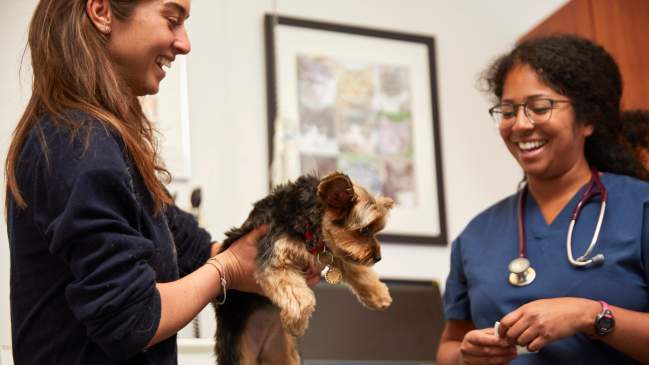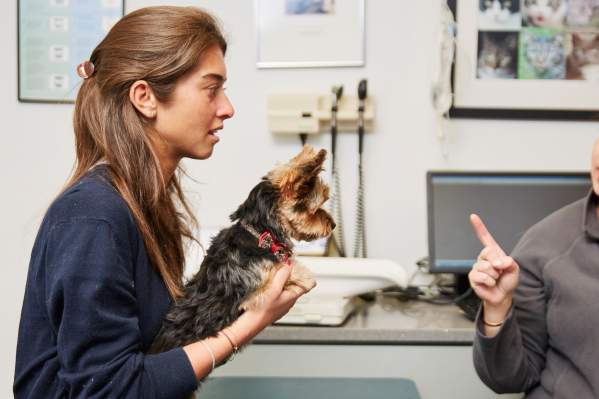Furry friends are part of your family. They are fun to have around, offer love and protection, and are also completely dependent on you for their care. There’s a lot that goes along with owning a pet, and it’s important to make sure you and your family veterinarian work together to keep them healthy and happy at home. Vets have the knowledge, skills, and passion to provide the best possible care for your pet. But that relationship is a two-way street, and vets want you to be willing to participate in your pet’s care. Here's what most vets wish their furry patient's parents knew.
1. They Know When You Fudge the Truth
"You're not doing your pet any favors by telling little white lies about their care," says Lianne Virenius, DVM, associate veterinarian at Antitoch Dog and Cat Hospital in Kansas City. "Fudging the truth about when they took their last meds or if you are feeding them table scraps can obscure any issues your pet may be facing and make it harder for your vet to diagnose the problem." Your furry friends can’t speak for themselves, so be honest with your vet — that way they can provide the best care for your pet.
2. Emergency Protection Is A Good Idea
Owning a pet can come with a hefty price tag, even if your furry friend is relatively low-maintenance. According to the American Kennel Club (AKC) the lifetime cost for caring for a medium-size dog or cat equals an average of $15,782. Even without emergency medical bills, maintenance care, such as getting your pet spayed or neutered, vaccinated, and groomed regularly, can add up over time. Consumer Reports advises pet owners to research plans based on the needs of your pets to find out if pet insurance is worth it for you.
3. Affection Is Better Than Scraps
We’re all guilty of slipping a few scraps of food under the table. But as much as you’d like to invite Fido to your dinner party, overindulging can lead to weight gain and other health problems. Show your dog some love, instead — affection is the best reward you can give your pet. Puppies need as many positive experiences as possible to help build confidence and develop their character — and the same is true for cats.
"Cats and dogs both thrive on affection and human contact," Dr. Virenius says. "Setting aside some playtime, or even petting them while you are watching TV or reading, is actually beneficial to both the pet and the owner." According to the AKC, rewarding your pet with praise, petting, or play can keep them strongly motivated — and ward off excess weight.
4. Your Vet Is Smarter Than the Internet
Many vets have the same pet peeve: the Internet. Pet owners often feel educated after searching for information on the Internet. However, a search engine doesn't always provide reliable advice when it comes to treating and caring for your pets. Instead of going on your own online hunt, rely on the years of training your vet has and talk to them before you make any decisions about treating your pet.
5. Vets Aren’t Just for Emergency Visits
Many pet owners think that a visit to the vet is just like going to the ER — you only need to go under dire circumstances. That’s simply not true. A new kitten or puppy needs to go to the vet a few times during their first year of life for general checkups and to get their vaccinations. Pets are typically spayed or neutered when they are about four months old. Once they're a year old, pets should go to the vet for an annual checkup unless they have health problems that require more frequent visits. As they start to age, it may be a good idea to bring your senior pet in for a visit twice a year. Scheduling regular checkups with the vet can help your pet stay as healthy as possible.
6. They Aren’t Miracle Workers
Vets have an especially difficult job because the patient (your pet) can’t actually tell them how they are feeling — and your vet can’t read your pet’s mind. Vets rely on their education, experience, and instinct to determine what’s going on with your furry friend. The best thing you can do is schedule regular preventative checkups to make sure you stay ahead of your pet's needs. Be patient with your vet and their team — remember that they are doing everything they can for your pet's well-being. If you aren’t happy with the care you're receiving, the American Veterinary Medical Foundation offers tips for how to find a reputable veterinarian.
7. Trust Their Advice

This probably seems like common sense, but when your vet gives you advice, take it. A vet's input comes from years of education and experience, and can help keep your pet out of harm’s way — there’s no substitute for professional advice, according to the American Animal Hospital Association (AAHA). While your friends, family, and breeders might have opinions, they likely don't have the formal education and well-rounded experience that your vet does.
Communication Is Key
Finding a vet you can develop a good relationship with is one of the best things you can do for your pet. That’s why it’s helpful for you to educate yourself on your pet’s needs and be honest with your vet regarding your their overall health, including diet, preventive care, and behavior. At the end of the day, most vets prefer when you participate in the process and ask questions about caring for your pet.
